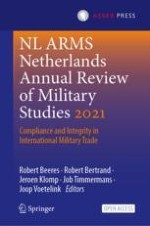This is open access volume of the NL ARMS offers an interdisciplinary view on the domain of Compliance and Integrity in International Military Trade (CIIMT), integrating defence economics, international law, arms export control frameworks and policies, information management, organizational sciences and ethics. Although, in academia, and from an interdisciplinary perspective, CIIMT constitutes a relatively novel research domain, across private and public defence-related sectors, the subject evokes high levels of attention and interest, instigating a need for critical thinking, reflection and creativity to address ensuing multi-faceted issues and problems.
The Faculty of Military Sciences at the Netherlands Defence Academy extends an in-house MSc programme on CIIMT, which, by integrating practice-based and scientific-based knowledge, aims to contribute to this need. The MSc programme on CIIMT is concerned with exploring, analysing, understanding, explaining, controlling and improving the military dimension in international military trade. More particularly, CIIMT studies managerial questions regarding strategic trade control of military and dual-use goods and services.
CIIMT ties in with the Netherlands Defence Academy’s vision on scientific education, embedded in the reflective practitioners' paradigm uniting both management and leadership skills needed to decide and operate in high-tension and high-risk knowledge intensive environments. The Faculty of Military Sciences uses the reflective practitioners’ paradigm to refer to critical thinking, reflection and Bildung that characterize its thinking doers, the so-called Thinking Soldiers, either at the academic Bachelor’s or Master’s level.
In view of the complexity of the international trade regarding military and dual-use goods and services, the rapid evolvement of strategic trade control and frameworks, and its importance to procurement processes, defence organizations require innovative thinking doers, who, based on an in-depth understanding, from an interdisciplinary perspective can be expected to find - and take responsibility for - creative solutions to problems.
NL ARMS 2021 comprises, amongst others, contributions from students and lecturers partaking in this programme.
All the editors are affiliated with the Faculty of Military Sciences of the Netherlands Defence Academy in Breda, The Netherlands.
